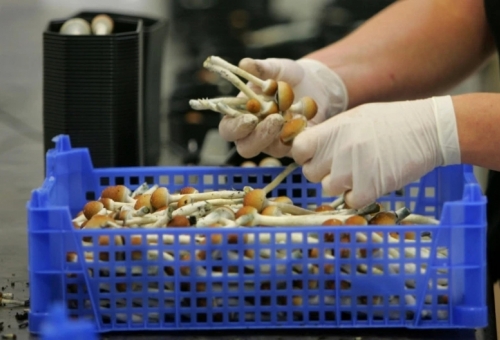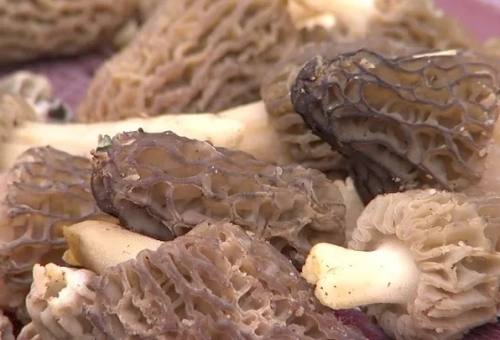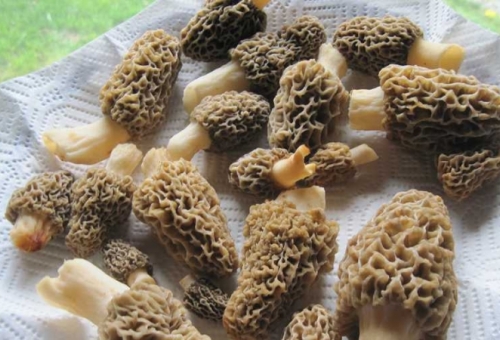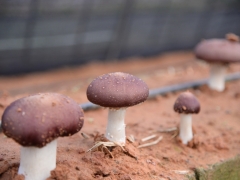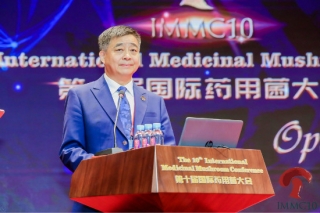SAN FRANCISCO – First came Denver. And now possibly Oakland, California, will help set the stage for other cities to consider decriminalizing hallucinogenic fungi, or “magic mushrooms.
Tuesday, Oakland’s City Council will vote on whether to direct law enforcement to stop investigating and prosecuting individuals for using or possessing drugs sourced from plants, cacti and – most commonly – mushrooms that contain the hallucinogen psilocybin.
Denver’s historic move last month was the result of a narrowly won popular vote. Oakland is the first city to address the issue through its City Council. The city's public safety commission advanced the resolution to the council last week.
“If this passes, it could really start something nationwide because it would show that if you have a progressive city council, things can change quickly,” says Carlos Plazola, director of Decriminalize Nature Oakland, one of the main organizations pushing the initiative.
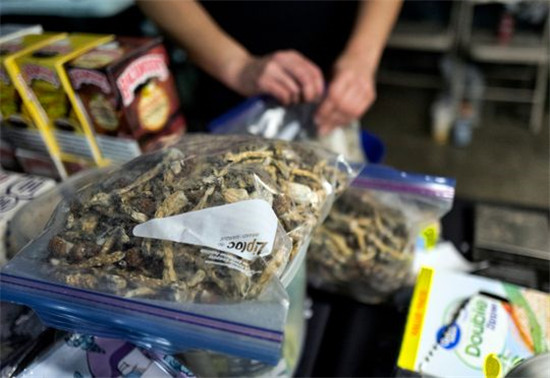
A vendor bags psilocybin mushrooms at a pop-up cannabis market in Los Angeles on Monday, May 6, 2019. (Photo: Richard Vogel, AP)
Advocates such as Plazola say such natural drugs have been used by various cultures for hundreds of years for everything from spiritual quests to helping battle psychiatric imbalances such as post-traumatic stress syndrome. They say legalizing mushrooms would free law enforcement to tackle higher-priority issues.
“We have many mental challenges on our streets today, and it’s important to be able to freely provide whatever medicinal support we can, including the use of plants that have beneficial effects for thousands of years,” says Oakland City Council member Noel Gallo, who presented the resolution.
“This move is backed by the people, by doctors, scientists and neighbors who all came to me asking for the police department to change their focus,” he says. “Having another city go before us was a good reference point. But we’re going to look toward making this an initiative on the California ballot in 2020.”
Other states eyeing 'shrooms'
California and Colorado are hardly alone. In Oregon, there’s a push underway to put the decriminalization of mushrooms on that state’s 2020 ballot, while in Iowa, Republican state Rep. Jeff Shipley pushes a mushroom bill in the state’s Legislature.
Denver activist Kevin Matthews, whose Decriminalize Denver organization helped tip the scales in favor of destigmatizing mushrooms in the Mile High City, says other cities will follow suit “because we have simply jump-started the conversation.”
Pot goes organic and pricey: As marijuana prices drop, growers push 'organic' cannabis – with a higher price tag
Matthews says, “Law enforcement has better things to do than criminalize mushroom users, since often what looks like recreational use is actually therapeutic use.”
Oakland police officials did not respond to a request for comment on the mushroom issue. Oakland council member Loren Taylor says police will “follow the guidance of the council.”
Taylor has some reservations about the proposal; he abstained from voting on the matter when it was in front of the public safety committee.
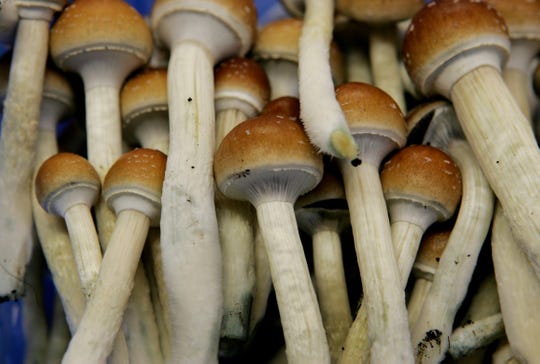
Magic mushrooms (Photo: Peter Dejong/AP)
“In the black community and others, we have fallen prey to drug use in a way that’s been problematic,” Taylor says. “I know these natural plants have some positive benefits, but I also know that releasing things without solid policies and operating models can have an adverse effect on our communities.”
Taylor is concerned that for some, decriminalization will mean a green light to start experimenting with new drugs. “I’m looking forward to having thorough conversations with advocates about these reservations,” he says.
Like Denver’s new mushroom law, Oakland’s proposal has narrow guidelines. It does not allow – in contrast to guidelines governing legal marijuana – for the sale or distribution of natural hallucinogenic drugs.
Instead, the resolution recommends an education campaign designed to inform the public on the possible benefits of moderate psilocybin use. It is against commercializing the drug and recommends that growers eventually set up a collective model, in which growers could distribute the plants for free.
Gateway to a 'trip'
Since 1970, psilocybin has been classified as a so-called Schedule 1 controlled substance, along with marijuana. Schedule 1 drugs carry with them a high probability of addiction and abuse and include hard-core substances such as cocaine, heroin and lysergic acid diethylamide, or LSD.
In the '60s, the height of psychologist and author Timothy Leary’s “Turn on, tune in, drop out” movement, a young generation fueled by psychedelic bands ranging from the Grateful Dead to the post mop-top Beatles experimented with hallucinogens, particularly the chemically manufactured variant of magic mushrooms, LSD.
Though so-called acid trips were said to expand the mind, they could also lead to frightening experiences if embarked on in less than ideal circumstances. From 1953 to 1973, the CIA conducted secret LSD experiments – often on unwitting test subjects – through a program known as MK-Ultra that was designed to study the mind-control possibilities of the drug.
The NFL and Pot: Is NFL on the verge of allowing marijuana for pain management?
The natural variety of psilocybin, typically found in certain types of mushrooms, has been used by Native American tribes and other indigenous peoples for centuries, often to help clear the mind of negative thoughts.
Last year, researchers at Johns Hopkins University in Baltimore published a study in the medical journal Neuropharmacology advising that psilocybin be reclassified from a Schedule 1 drug with no known benefits to a Schedule 4 drug, which would put it in the same category as prescription sleeping pills.
Although the researchers stressed that the administration of micro-doses of psilocybin needs to have strict oversight by medical professionals, they said the drug harbored potential benefits for those suffering from everything from depression to cigarette addiction.
Before the Food and Drug Administration can be petitioned to make psilocybin a Schedule 4 drug, at least five more years of clinical research and trials are required, according to the researchers.
Cannabis 101: What to expect from Colorado’s most exclusive dispensaries
In the meantime, Denver’s Matthews says he’ll watch Oakland’s City Council debate carefully.
“Since our vote, we’ve heard from people from Anchorage to Washington, D.C., all asking how to move forward,” he says. “But the fact that we could have a city council rule on this, that could be a game changer that causes other cities to follow suit fast.”
Plazola of Decriminalize Nature Oakland says he’s heard from a host of California cities, as well as a few in Mexico, all asking for advice on making magic mushroom use legal in their communities.
"There’s a reason this movement is growing,” he says. “This is about drugs that should never have been criminalized in the first place.”





